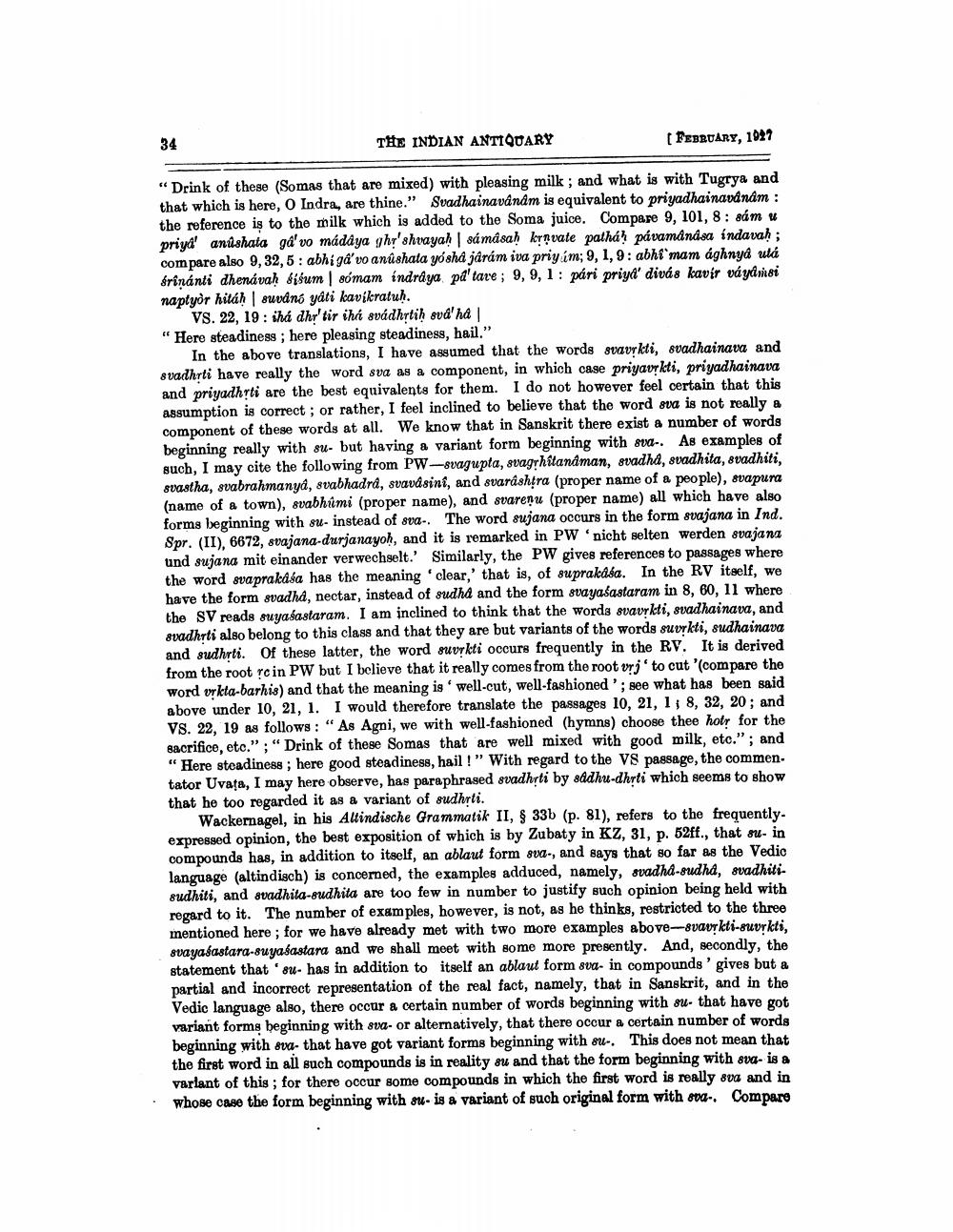________________
THE INDIAN ANTIQUARY
FEBRUARY, 1027
“Drink of these (Somas that are mixed) with pleasing milk; and what is with Tugrya and that which is here, 0 Indra, are thine." Svadhainavanam is equivalent to priyadhainavdnam : the reference is to the milk which is added to the Soma juice. Compare 9, 101, 8: sám u priyd' anushata gá' vo máda ya ghr'shvayah | sámásah krnvate pathál pávamandsa indavah; compare also 9, 32,5 : abhi ga'vo anúshata yosha járám iva priy im; 9, 1, 9: abhi mam ághnya ula frinanti dhenavah lísum sómam indraya pd' tare ; 9, 9, 1: pári priya' divás kavír váydmisi naptyør hitáh | suvánó yáti kavikratuh.
VS. 22, 19:ihá dhr' tir ihá svádhrtih svd'ha "Here steadiness; here pleasing steadiness, hail."
In the above translations, I have assumed that the words svavykti, svadhainava and svadhrti have really the word sva as a component, in which case priyavrkti, priyadhainava and priyadhíti are the best equivalents for them. I do not however feel certain that this assumption is correct; or rather, I feel inclined to believe that the word sva is not really a component of these words at all. We know that in Sanskrit there exist a number of words beginning really with su- but having a variant form beginning with eva-. As examples of such, I may cite the following from PW-Svagupta, svagshitandman, svadhå, svadhita, svadhiti, svastha, svabrahmanya, svabhadrá, svavasini, and svarashtra (proper name of a people), svapura (name of a town), svabhumi (proper name), and svarenu (proper name) all which have also forms beginning with su- instead of sva-. The word sujana occurs in the form svajana in Ind. Spr. (II), 6672, svajana-durjanayoh, and it is remarked in PW 'nicht selten werden svajans und sujana mit einander verwechselt.' Similarly, the PW gives references to passages where the word svaprakasa has the meaning clear,' that is, of suprakása. In the RV itself, we have the form svadha, nectar, instead of sudha and the form svayaśastaram in 8, 60, 11 where the SV reads suyasastaram. I am inclined to think that the words svavykti, svadhainava, and svadhrti also belong to this class and that they are but variants of the words suvykti, sudhainava and sudhrti. Of these latter, the word suvykti occurs frequently in the RV. It is derived from the root rcin PW but I believe that it really comes from the root vrj' to cut '(compare the word vrkta-barhis) and that the meaning is well-cut, well-fashioned '; see what has been said above under 10, 21, 1. I would therefore translate the passages 10, 21, 1: 8, 32, 20; and VS. 22, 19 as follows: "As Agni, we with well-fashioned (hymns) choose thee hoty for the sacrifice, etc." ; "Drink of these Somas that are well mixed with good milk, etc."; and "Here steadiness ; here good steadiness, hail !” With regard to the V8 passage, the commen. tator Uvața, I may here observe, has paraphrased svadhrti by addhu-dhrti which seems to show that he too regarded it as a variant of sudhrti.
Wackernagel, in his Altindische Grammatik II, § 33b (p. 81), refers to the frequently. expressed opinion, the best exposition of which is by Zubaty in KZ, 31, p. 52ff., that su- in compounds has, in addition to itself, an ablaut form sva-, and says that so far as the Vedic language (altindisch) is concerned, the examples adduced, namely, svadha-sudha, svadhitisudhiti, and svadhita-sudhita are too few in number to justify such opinion being held with regard to it. The number of examples, however, is not, as he thinks, restricted to the three mentioned here ; for we have already met with two more examples above--Svavrkti-suvrkti, svayafastara-suyafastara and we shall meet with some more presently. And, secondly, the statement that 'su- has in addition to itself an ablaut form sva- in compounds' gives but a partial and incorrect representation of the real fact, namely, that in Sanskrit, and in the Vedic language also, there occur a certain number of words beginning with su- that have got variant forms beginning with sva- or alternatively, that there occur a certain number of words beginning with sva- that have got variant forms beginning with ou. This does not mean that the first word in all such compounds is in reality su and that the form beginning with sva- is a varlant of this; for there occur some compounds in which the first word is really sva and in whose case the form beginning with su-is a variant of such original form with oua. Compare




